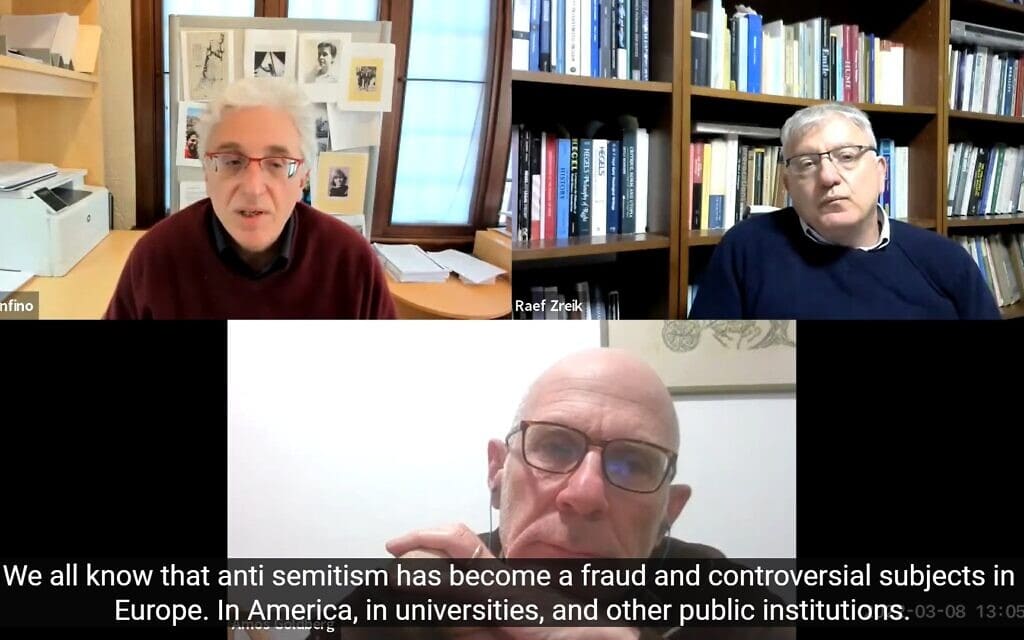On May 8, 2022, the Institute for Holocaust Studies, Genocide and Remembrance at the University of Massachusetts, Amherst, posted a discussion on their official YouTube channel that contained unfounded allegations about the International Holocaust Remembrance Alliance (IHRA) working definition of antisemitism.
Hosted and moderated by Alon Confino, chair of the Institute for Holocaust Studies and a history professor at Amherst, the webinar also featured Amos Goldberg and Raef Zreik, professors at Hebrew University and Ono Academic College, respectively. The three academics boasted about their anti-Zionist activism, and promoted their campaign against adopting the IHRA definition of antisemitism.
Professors Confino and Goldberg spent much of their time on the webinar denouncing the IHRA definition, and echoing the sentiment of an article where they jointly argue that, “The IHRA definition is nothing but a document used by Israeli propagandists to protect Israel against any harsh criticism regarding its attitude toward the Palestinians.”
In December 2020, Professor Zreik signed a petition that claimed: “The IHRA is used to delegitimize the Palestinian cause and silence defenders of Palestinian rights,” a bald-faced lie that he reiterated throughout the webinar.
Zreik also complains about the semantics of the term “antisemitism,” but fails to acknowledge the history of the world’s oldest hatred.
Zreik’s attempt to redefine antisemitism is an age-old attempt to trivialize the Jewish experience. For thousands of years, Jews have remained the target of systemic discrimination and intense pressure to erase their culture, language, and identity. These experiences have come to be known as antisemitism. It is disrespectful and intellectually dishonest to appropriate this term to describe something completely unrelated.
Contrary to Confino, Golberg, and Zreik’s mischaracterization, the International Holocaust Remembrance Alliance is an intergovernmental organization that makes it clear in its working definition that criticism of Israel, in and of itself, is not antisemitic.
One of the significant concerns with the professors’ opposition to the IHRA is their history of anti-Zionist activism and extremism. Unfortunately, their personal opinions appear to take precedent over the facts.
For instance, the Jerusalem Declaration of Antisemitism (JDA) that is promoted by Confino and Goldberg has routinely proven insufficient in addressing antisemitism. Worse yet, in some cases, the JDA only serves to legitimize contemporary forms of antisemitism.
For example, the JDA states that “comparing Israel with other historical events, such as apartheid or settler colonialism, is not anti-Semitism in itself.” However, very often these claims are themselves rooted in age-old antisemitic canards of Jewish conspiracy and criminality.
Furthermore, the JDA argues that boycotts against Israel are not necessarily antisemitic. This statement is intended to create confusion about the antisemitic nature of the BDS campaign against Israel. BDS supporters may try to whitewash its antisemitic motives, but their actions say otherwise.

For example, the recent BDS Mapping Project targeted Jewish and Zionists institutions, including listing their addresses, for being “responsible for the colonization of Palestine.” It was rightfully widely denounced for promoting antisemitic conspiracies.
Unsurprisingly, Confino, Goldberg, and Zreik maintain ties to the discriminatory BDS campaign; its leaders have called for the elimination of the State of Israel, and push an agenda of anti-normalization.
Zreik incorrectly characterizes Israel’s defensive war against neighboring Arab states in 1948 as the “ethnic cleansing” of Palestinians.
This “Nakba” narrative depicting Jews as ethnic cleansers is false. CAMERA’s Gilead Ini has addressed this claim in a backgrounder on the subject where he writes that:
Regardless of the causes [of the War of 1948], the bottom line is that had the Arab world, including the Palestinians, not chosen to launch a war of destruction against the Jewish state, the much-discussed Palestinian refugee problem would not exist.
While not mentioned in the discussion, it is important to note that Confino co-authored a book titled “The Holocaust and the Nakba,” a text edited by none other than his webinar guest, Amos Goldberg.
Confino, Goldberg, and Zreik join the list of personalities and organizations propagating Holocaust inversion. It is incredibly disingenuous and insulting to falsely accuse Jews of ethnic cleansing and crimes comparable to the Holocaust.
It isn’t hard to see why Confino, Goldberg, and Zreik take issue with the IHRA working definition of antisemitism. In this webinar alone, the three discussed the possibility of a “pro-Israel” conspiracy, defended the targeting of Jews by anti-Zionists as a form of “activism,” and shared their affinity for anti-Jewish historical revisionism. Behind the academic-speak and the imprimatur of their respective academic institutions lies an antisemitic agenda, one that they evidently do not want to be challenged by those informed by the IHRA’s working definition of antisemitism.
Wrriten by Israel’s campus advisor Tom Yohay. translated Mor Yerushalmi
Was orignially published in the Algemeiner
למאמר בעברית לחצו כאן

